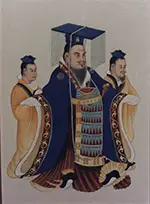Emperor Wu of China
Liu Che, known as Wu, ruled China for more than five decades during the Han Dynasty. Many historians consider Wu to be among China's greatest emperors. Born in 157 B.C. in Chang'an, he was the son of Liu Qi and was born on the day that his father became Emperor Jing. He was the 11th son of the emperor but grew up in the royal household as his father's favorite and was named crown prince in 149 B.C. He became emperor when his father died, in 141 B.C. He had earlier married Chen, an older cousin, and he named her empress not long after he took the throne. Wu ruled for 54 years and oversaw many significant developments, including the development of the famous Silk Road, from 138 B.C., and a large territorial expansion, including what is now parts of Korea, Mongolia, and Vietnam. Emperor Wu, about 135 B.C., restored Confucius to prominence. The Qin emperors had shunned the philosopher's teachings. A year earlier, the imperial university had introduced a program to study the Five Classics of Confucianism:

Wu embarked on a series of significant changes known as the Jianyuan Reforms, which upset several elements of the established order. To help facilitate these reforms, he created what was called the "insider court," a number of young commoners whom he appointed to governmental positions that reported directly to the emperor. One of the goals of his reforms was to eliminate the favoritism that permeated nearly all levels of government and to increase the power of the throne by weakening the control of various nobles and local officials over things like transportation. The emperor succeeded in his reforms, although it took longer than he thought it would. The struggles against the Xiongnu, a loose confederation of nomads who lived to the north and west of China, continued off and on for many years. A Xiongnu numbering nearly 1 million raided Han China in 126 B.C. Emperor Wu led an army nearly as large in retaliation in 110 B.C. and forced the Xiongnu to retreat. The struggles continued for decades, punctuated by periods of peace and even alliances through intermarriages. During the latter decades of Wu's reign, the emperor adopted more and more the trappings of despotism. He ordered built Jianzhang Palace, a luxurious residence that was designed to bring him closer to heaven and that he adopted as his personal residence. As a means of paying for his wars of expansion, he time and again increased levies on the population; more than revolt resulted from this intense taxation. In 106 B.C., he divided his empire in 13 prefectures, each of which was run by a supervisor who served at the whim of the emperor. Wu feared for his life on many an occasion, and he increasingly distrusted those around him, including his wife, whom he deposed in 130 B.C. Several times, he had arrested people he suspected of trying to kill him. He also suspected the crown prince, Prince Ju, of this. A small-scale insurrection ensued, and Prince Ju fled to the countryside, where he was eventually found and, rather than submit to his father's soldiers, took his own life. Emperor Wu eventually became ashamed of his actions and issued a public apology, known as the Repenting Edict of Luntai. Also as he grew older, the emperor grew more and more concerned with extending his life. Some of his predecessors, Shi-huang-di notably among them, had pursued supernatural means of increasing their lifespan. Wu did so as well but was ultimately unsuccessful in these endeavors, dying in 87 B.C. He had declared his youngest son, Liu Fuling, to be his successor, and he took the throne after his father's death. He was later known as Emperor Zhao. |
|
Social Studies for Kids
copyright 2002–2024
David White




